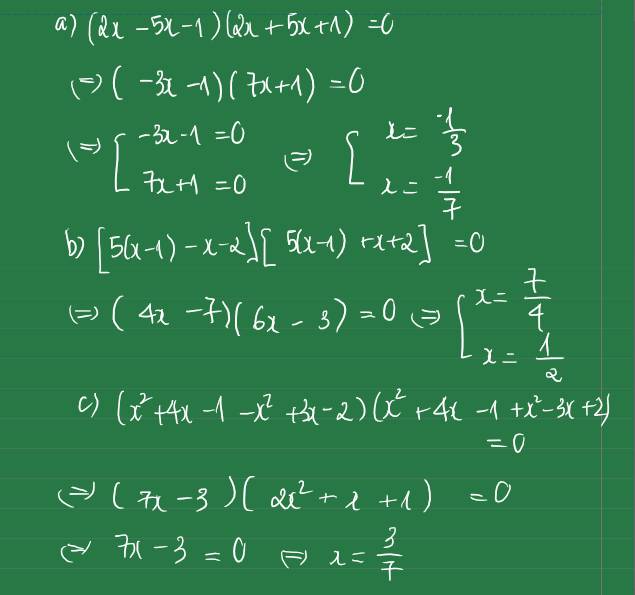Hãy nhập câu hỏi của bạn vào đây, nếu là tài khoản VIP, bạn sẽ được ưu tiên trả lời.

ĐKXĐ: \(x\ne\left\{-4;-5;-6;-7\right\}\)
\(\dfrac{1}{x^2+9x+20}+\dfrac{1}{x^2+11x+30}+\dfrac{1}{x^2+13x+42}=\dfrac{1}{18}\)
\(\Leftrightarrow\dfrac{1}{\left(x+4\right)\left(x+5\right)}+\dfrac{1}{\left(x+5\right)\left(x+6\right)}+\dfrac{1}{\left(x+6\right)\left(x+7\right)}=\dfrac{1}{18}\)
\(\Leftrightarrow\dfrac{1}{x+4}-\dfrac{1}{x+5}+\dfrac{1}{x+5}-\dfrac{1}{x+6}+\dfrac{1}{x+6}-\dfrac{1}{x+7}=\dfrac{1}{18}\)
\(\Leftrightarrow\dfrac{1}{x+4}-\dfrac{1}{x+7}=\dfrac{1}{18}\)
\(\Leftrightarrow\dfrac{3}{\left(x+4\right)\left(x+7\right)}=\dfrac{1}{18}\)
\(\Rightarrow\left(x+4\right)\left(x+7\right)=54\)
\(\Leftrightarrow x^2+11x-26=0\)
\(\Leftrightarrow x^2-2x+13x-26=0\)
\(\Leftrightarrow x\left(x-2\right)+13\left(x-2\right)=0\)
\(\Leftrightarrow\left(x-2\right)\left(x+13\right)=0\)
\(\Leftrightarrow\left[{}\begin{matrix}x=2\\x=-13\end{matrix}\right.\)

\(\frac{1}{\left(x+2\right)\left(x+3\right)}+\frac{1}{\left(x+3\right)\left(x+4\right)}+\frac{1}{\left(x+4\right)\left(x+5\right)}+\frac{1}{\left(x+5\right)\left(x+6\right)}=\frac{1}{x+2}-\frac{1}{\left(x+6\right)}\)
\(\frac{1}{t}-\frac{1}{t+4}=\frac{4}{t\left(t+4\right)}=\frac{1}{8}=\frac{4}{32}\Rightarrow t=4\Rightarrow x=2\)

pt <=> 1/(x+2).(x+3) + 1/(x+3).(x+4) + 1/(x+4).(x+5) + 1/(x+5).(x+6) = 1/8
<=> 1/x+2 - 1/x+3 + 1/x+3 - 1/x+4 + 1/x+4 - 1/x+5 + 1/x+5 - 1/x+6 = 1/8
<=> 1/x+2 - 1/x+6 = 1/8
<=> (x+6-x-2)/(x+2).(x+6) = 1/8
<=> 4/(x+2).(x+6) = 1/8
<=>(x+2).(x+6) = 4 : 1/8 = 32
<=>x^2 + 8x + 12 = 32
<=> x^2+8x+12-32=0
<=>x^2+8x-20=0
<=>(x-2).(x+10)=0
<=> x-2 =0 hoặc x+10 = 0
<=> x=2 hoặc x=-10
giang sinh an lanh $%###Xuyen gam cu chuoi###%$

1) Ta có: \(x^2-4x+4=0\)
\(\Leftrightarrow\left(x-2\right)^2=0\)
\(\Leftrightarrow x-2=0\)
hay x=2
Vậy: S={2}

\(a)x^2-9x+20=0 \\<=>(x-4)(x-5)=0 \\<=>x=4\ hoặc\ x=5 \\b)x^2-3x-18=0 \\<=>(x+3)(x-6)=0 \\<=>x=-3\ hoặc\ x=6 \\c)2x^2-9x+9=0 \\<=>(x-3)(2x-3)=0 \\<=>x=3\ hoặc\ x=\dfrac{3}{2}\)
d: \(\Leftrightarrow3x^2-6x-2x+4=0\)
=>(x-2)(3x-2)=0
=>x=2 hoặc x=2/3
e: \(\Leftrightarrow3x\left(x^2-2x-3\right)=0\)
=>x(x-3)(x+1)=0
hay \(x\in\left\{0;3;-1\right\}\)
f: \(\Leftrightarrow x^2-5x-2+x=0\)
\(\Leftrightarrow x^2-4x-2=0\)
\(\Leftrightarrow\left(x-2\right)^2=6\)
hay \(x\in\left\{\sqrt{6}+2;-\sqrt{6}+2\right\}\)

\(|x-6|=-5x+9\)
Xét \(x\ge6\)thì \(pt< =>x-6=-5x+9\)
\(< =>x-6+5x-9=0\)
\(< =>6x-15=0\)
\(< =>x=\frac{15}{6}\)(ktm)
Xét \(x< 6\)thì \(pt< =>x-6=5x-9\)
\(< =>4x-9+6=0\)
\(< =>4x-3=0< =>x=\frac{3}{4}\)(tm)
Vậy ...

phân tích mẫu thành nhân tử r` tách ra rút gọn như kiểu bài tính của lớp 5 ấy
bài tương tự : Câu hỏi của Lê Phương Oanh - Toán lớp 8 | Học trực tuyến (https://h-o-c-24.vn/hoi-dap/question/179719.html)

Bài 1)1)\(x^2+5x+6=x^2+3x+2x+6\)=0
=x(x+3)+2(x+3)=(x+2)(x+3)=0
Dễ rồi
2)\(x^2-x-6=0=x^2-3x+2x-6=0\)
=x(x-3)+2(x-3)=0
=(x+2)(x-3)=0
Dễ rồi
3)Phương trình tương đương:\(\left(x^2+1\right)\left(x+2\right)^2=0\)
Vì \(x^2+1>0\)
=>\(\left(x+2\right)^2=0\)
Dễ rồi
4)Phương trình tương đương\(x^2\left(x+1\right)+\left(x+1\right)\)=0
=> \(\left(x^2+1\right)\left(x+1\right)=0Vì\) \(x^2+1>0\)
=>x+1=0
=>..................
5)\(x^2-7x+6=x^2-6x-x+6\) =0
=x(x-6)-(x-6)=0
=(x-1)(x-6)=0
=>.....
6)\(2x^2-3x-5=2x^2+2x-5x-5\)=0
=2x(x+1)-5(x+1)=0
=(2x-5)(x+1)=0
7)\(x^2-3x+4x-12\)=x(x-3)+4(x-3)=(x+4)(x-3)=0
Dễ rồi
Nghỉ đã hôm sau làm mệt

a: =>(2x-5x-1)(2x+5x+1)=0
=>(-3x-1)(7x+1)=0
=>x=-1/3 hoặc x=-1/7
b: =>(5x-5)^2-(x+2)^2=0
=>(5x-5-x-2)(5x-5+x+2)=0
=>(4x-7)(6x-3)=0
=>x=1/2 hoặc x=7/4
c: =>(x^2+4x-1-x^2+3x-2)(x^2+4x-1+x^2-3x+2)=0
=>(7x-3)(2x^2+x+1)=0
=>7x-3=0
=>x=3/7






\(\Leftrightarrow\dfrac{1}{\left(x+2\right)\left(x+3\right)}+\dfrac{1}{\left(x+3\right)\left(x+4\right)}+...+\dfrac{1}{\left(x+5\right)\left(x+6\right)}=\dfrac{1}{8}\)
=>\(\dfrac{1}{x+2}-\dfrac{1}{x+3}+\dfrac{1}{x+3}-\dfrac{1}{x+4}+...+\dfrac{1}{x+5}-\dfrac{1}{x+6}=\dfrac{1}{8}\)
=>1/x+2-1/x+6=1/8
=>\(\dfrac{x+6-x-2}{\left(x+2\right)\left(x+6\right)}=\dfrac{1}{8}\)
=>x^2+8x+12=32
=>x^2+8x-20=0
=>(x+10)(x-2)=0
=>x=-10 hoặc x=2